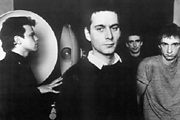AMID THE BLUSTER of England’s mid-1970s punk uprising came a band that tweaked a formula even while it was being created. Wire snarled like the Sex Pistols or the Clash, but they also emphasized the simple groove, the space between notes. Theirs was a minimalist, angular punk; the famous cover of the 1977 debut Pink Flag, with its sky-blue background and sharply straightforward image of a pink flag, suggested this, as did Colin Newman’s oblique battle cry on the grinding title track: “How many dead or alive?”
Wire
Showbox, Saturday, May 6
Never mind the bollocks, in other words—we’re Wire. But Wire didn’t become a household name. A 1978 follow-up, Chairs Missing, and a 1981 live album accompanied by a disbanding, began to foment the band’s reputation as a group of innovators who never quite got their due. They’d reform in the late ’80s and add a few noteworthy records to their catalog (The Ideal Copy in 1987 and A Bell is a Cup . . . Until It Is Struck a year later), but while Pink Flag should have rated up there with the early Velvet Underground and Talking Heads albums as art-punk’s seminal masterpieces, both the album and the band that produced it remained a secret among underground, in-the-know record geeks.
“Wire’s always had the tag of being a musician’s band, and we never really set out to do that,” intones Newman from his home in London. “It’s just how it turned out because I guess the things we were doing—he says modestly—were a bit ahead of their time.”
They were also, it turns out, timeless. Ten years after Pink Flag‘s release, R.E.M. would include a faithful rendition of the album’s “Strange”—albeit with a self-involved lyrical switch courtesy of Michael Stipe—on Document that most R.E.M. fans wouldn’t have even guessed was a cover. In 1995, Elastica had a hit debut that most critics derided as a complete rip-off of Wire. (A subsequent lawsuit charged Elastica with plagiarism. Of the period Newman says, “It’s a dismally sad story. We made a bit of money off it . . . but not as much as we should have.”)
Now Newman and Wire’s three other cofounding veterans—guitarist Graham Lewis, bassist Bruce Gilbert, and drummer Robert Gotobed—are betting that their sound still resonates today. They reformed again late last year, and they’re playing their first US tour since the ’80s.
The latest reunion came about when a friend asked the four to perform as Wire at a London festival. That didn’t work out, but a subsequent invitation to play the stately Royal Festive Hall proved too tempting to refuse. They rented a rehearsal room for three days, worked out a set list’s worth of songs, and went on as Wire and in their various incarnations (solo, duets, etc.). It didn’t end there; they performed last month at a festival with Sonic Youth and other similar acts, and now they’ve scheduled a six-city tour of the States.
Newman’s quick to point out that Wire’s doing this not as part of a commercialized reunion tour, but rather as an expression of the band’s continuing artistic presence.
“One of the characteristics of Wire 2000 is that we’re able to play songs that are over 20 years old and play them as if they were written yesterday,” he explains. “It sounds very current, which is something we require of it. Just because we’re playing some old material doesn’t mean it’s a retro show. We’re not into that kind of concept.”
WHETHER WITH THE ARTFUL punk of Pink Flag or the new wave-inspired songs of their late-’80s resurgence, Wire always achieved considerable substance as a result of, rather than as a by-product of, the foursome’s style. Not classically trained or technically spectacular, they developed their sound through practice and the eventual, inexplicable connectedness that blesses only truly special bands.
A promotional CD sent to critics to advance the current tour captures the reformed Wire on their third day of last year’s rehearsals, and the chopped-up rhythms and unmistakable grooves are already intact. Perhaps the long periods apart enable the musicians to maintain a fresh approach, or maybe they’ve ascended to a level of indelible chemistry.
“Really none of the Wire material has ever been based on musicianship,” notes Newman, who admits that he sometimes goes years without picking up his guitar. “It’s about the ensemble playing. It’s about the kind of noise you can make together and putting together simple elements in an interesting way. I don’t think the members of Wire understand any better than anybody else does. It just happens that when we get in a room, and certain things are done in a certain way, somehow we’re able to consciously manipulate that.”
It’s rare to find musicians who take such delight in their accomplishments, especially considering that Wire has hardly been able to cash in on its credibility. Newman admits that being so influential has its emotional rewards, but a little cash wouldn’t be unwelcome.
“If I had a dollar for every person who came up to me and said, ‘I was a huge fan and you were really responsible for getting me involved in what I’m doing now,'” he says, pausing for a breath, “I would be a lot richer than I am.”






